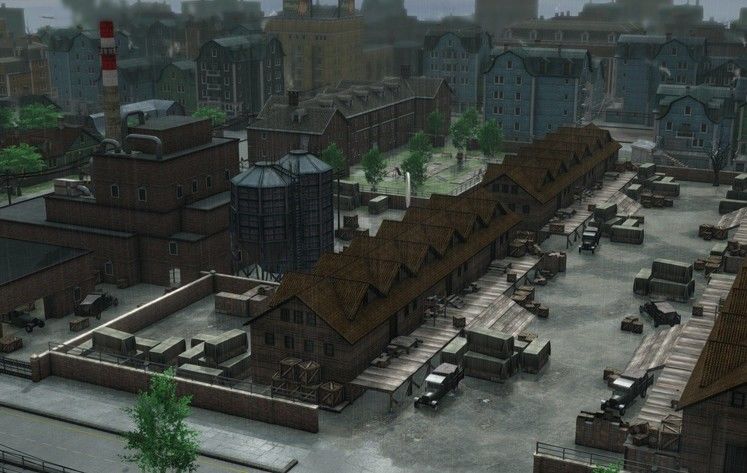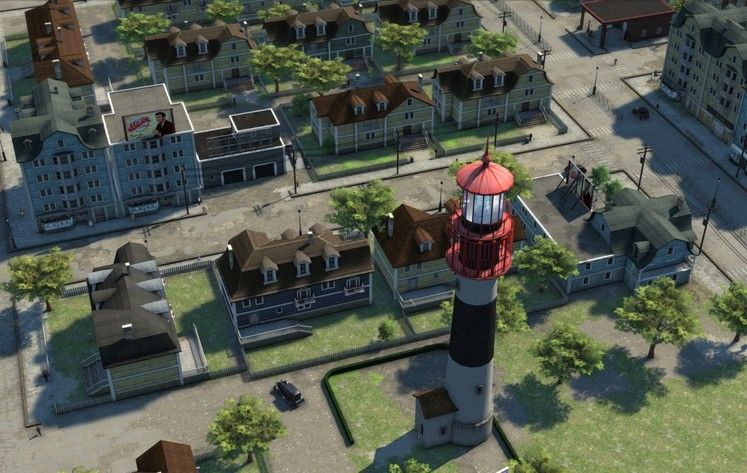It’s a setting I love so much that it can carry even a more mediocre game, and so when Mafia II was good-but-not-great, the twists and turns of its story, which borrowed heavily from movies on the same subject matter, saw me through the game’s problems without complaints mounting so high that I stopped playing.
 |
| The '20s: not always as glamorous as you think. |
The same is true of Omerta: City of Gangsters, the latest title from Haemimont Games, the team behind the successful recent revival of Tropico.
On paper, that partnership makes sense; Tropico is a Sim City style game with the unique twist of placing you in the often goose-stepping boots of a dictator of a small island nation. In addition to ensuring the island prospered, you’d spend time sabotaging your rivals. It’s a bloody fun game. The logic here is simple - a city-management game involving taking over a New York-like city in the '20s through nefarious means would work similarly - and it does. Sort of.
All the things you’d expect are here - you can extract protection money from local businesses, muscle local gangs, import or produce illegal weapons and alcohol, offer loans with dangerously high repayment rates and, of course, set up illicit businesses such as crooked lawyers, fight clubs or underground bars to sell your previously produced booze.
Before you get started, you’re tasked to create a character - and this process is cleverly streamlined. Rather than ask you to pick perks or dish out ability points, the game asks you questions. Why was your gangster forced from Italy, for instance? Was he on the run - and if so what for - or did he just want a piece of America? These things determine your stats and your starting weapon.
You’re given a view of the city and a gang - which begins as just you and one other guy, but quickly grows up to a maximum of six playable characters at any time - and set to work. Clicking on buildings reveals its current status, though that quickly introduces one of my first problems with Omerta - a clear divide.
Buildings in the game either fill a legal purpose or an illegal purpose - and never shall the twain meet. The protection racket, for instance, can only extract money from other illegal businesses. If you want to be the only illegal businesses in town, it is rendered rather useless. Once you’ve driven out everybody else either with money or fear, every building that actually features a regular gameplay purpose is one owned by you. That’s a shame.
In any given area you can quickly discover the buildings that actually matter, than, and while you can burgle or purchase legal buildings, they end up being little more than scenery. My dream of being equally loved and feared for harassing both other mobsters and perfectly above-board businesses sadly can’t be done.
The love-versus-feared mechanic is actually there, though - and the two ratings are wisely separate from each other. Setting up a cold-blooded business or sending a guy with a baseball bat to extract information on other illegal businesses in the area from an informant will make you feared and rise the ire of the authorities, but doing things for the community like throwing a party, setting up an underground fighting ring (because who doesn’t love two guys beating each other to near-death consensually?) or offering free food to the needy will make you more liked. These ratings have a direct effect on the performance of some businesses.
 |
| Shouldn't the lighthouse be in Tropico? |
Another clever concept is how money is split into ‘dirty’ and ‘clean’ - clean money is worth more, and can be used for anything, while dirty money can only be used in criminal transactions. Some businesses generate clean money, while you can also launder dirty money over time. It’s a good concept, and one that makes you work hard to finally get your foot in the door with some legitimate businesses such as hotels or night clubs.
The writing is fun, needling the best of the tropes of the genre. I fully expected this, coming from Tropico, but I can relay my satisfaction with that to you guys. Two of the playable characters are brothers called Mario and Luigi, too, and the former introduces himself with “It’s a-me, Mario!” which I had to admit did give me a chuckle. Top stuff all round - and the character portraits are great.
The empire-building part of Omerta is actually quite satisfying, marred by issues that start out as a minor inconvenience but become a major pain over time. The biggest offender of all is time - most games like this, including Tropico, feature a fast-forward, but Omerta lacks one. Sometimes you’ll be forced to sit there for minutes at a time in order to accrue the money or other resources you need to make something happen. That isn’t fun.
Regrettably also not fun is the second half of the game, combat. This is probably best-described as a lighter, easier version of XCOM: Enemy Unknown. It’s an isometric turn-based battle system with different classes of character based on weapons - there’s folks with tommy-guns, shotguns, pistols, knifes, bats and straight up melee - and their move set is based on that.
Each character starts a turn with Move Points and Action Points, and can continue until both are depleted. The enemies get turns too, and everything works pretty well - but it’s just uninteresting and boring. There’s nothing about these combat scenarios that really gets the blood pumping, and it is plain that this game comes from a team who, for the most part, only work in the PC strategy and simulation space. Actual combat seems to have eluded them.
It often isn’t clear when exactly an enemy will enter your line of sight, which is a pain, but worse than that is the cover. Of an entire wall, only two or three designated spots might actually work as cover. In one mission, my gang ended up fighting around a car - and the entire side of the car only had proper cover for two people, once at each wheel.
The other gang members just stood next to the doors of the car, not covered, easily shot. The end result was that many times shoot-outs happened with guys standing in the open, firing at each other at point blank range. Battles can mercifully be skipped with a Total War style auto resolve option, but I’m not sure the empire building side of the game is good enough alone.
 |
| Tired of being a gangster? How about a stroll down the boardwalk? |
I tested the Xbox 360 version of Omerta, which controlled fine. The 360 versions of Tropico both had decent performance, and the same is true here. As well as working smoothly on a technical level, the actual control scheme is well-thought out. It’s clear that Omerta began life with both platforms in mind instead of console being tacked on as an after-thought.
However, I did spend extensive time with the PC release also, and the story is the same but with slightly more suitable and easy-to-use controls. Some of the battle issues are alleviated by keyboard and mouse, too - but it doesn’t solve the core problem of them just being a bit rubbish.
Omerta: City of Gangsters should have been an offer that I couldn’t refuse - but in the end, it’s just damp. It sits in the impressive shadow Tropico casts looking rather forelorn, and fails to really capitalize on its brilliant setting. I can only truly recommend this if you’re a particular fan of the genre, the setting, or Haemimont’s work.
OMERTA: CITY OF GANGSTERS VERDICT
Omerta: City of Gangsters should have been an offer that I couldn’t refuse - but in the end, it’s just damp. It sits in the impressive shadow Tropico casts looking rather forelorn, and fails to really capitalize on its brilliant setting. I can only truly recommend this if you’re a particular fan of the genre, the setting, or Haemimont’s work.
TOP GAME MOMENT
Completely taking over one map, meaning I owned or had every business under my thumb. Satisfaction!




